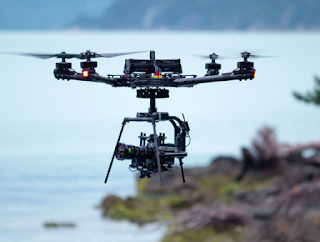Many drone operators consider themselves to be cinematographers or photographers. An arbitrator in a Hollywood labor dispute has agreed, granting
drone cinematographers on a motion picture or film the same rights as other cinematography professionals.
Hollywood
Reporter April 29, 2020
Five individuals working on a TV show should have been
covered under an agreement between cinematographers and producers, an
arbitrator ruled April 21.
Thanks to COVID-19, many are losing their jobs while
others are now worried about maintaining health insurance. But one group in
Hollywood may have just taken a step toward realizing employee benefits. That
would be Hollywood's drone operators, who were the subject of a lengthy fight
in arbitration over classification and jurisdiction.
After Warner Bros. hired drone technicians in 2015
for Rush Hour, a TV series based on the film franchise, the
International Cinematographers Guild initiated arbitration in an attempt to get them health
and pension benefits afforded to employees under its collectively bargained
agreement with producers.
On Friday, near the end of a virtual meeting with
its members about COVID-19, the guild shared "good news," that the
arbitrator had largely ruled in its favor.
ICG insisted its labor agreement covered those who worked
in "all phases of motion and still picture photography,” including members
of a drone crew, who they asserted should be afforded the same treatment as
aerial directors of photography, camera operators and camera technicians. They
argued that drone technicians make similar creative decisions regarding camera
placement and shot execution.
Warner Bros. saw these individuals closer to helicopter
pilots who haven't been traditionally covered under the ICG agreement. The
studio further told the arbitrator that drone technicians were really
subcontractors, and any decision holding otherwise could mean WB is acting as
an unlicensed drone operator. That could raise trouble with the Federal
Aviation Administration.
According to ICG, the arbitrator found April 21 that
Warner Bros. should have covered five members of the drone crews working
on Rush Hour under the terms of the guild's basic agreement.
One drone pilot was not covered, the arbitrator ruled, because he piloted the
drone while an operator worked the camera and, unlike another drone pilot, did
not exercise artistic skill in operating the drone.
ICG further shared with its members, "The arbitrator
found that the employer had the burden to prove that it was subcontracting for
work that was not covered by the Local 600 Basic Agreement, and that Warner
Bros. did not meet that standard. "
The arbitrator's award is said to not be final with
damages still yet to be determined.
Because the Rush Hour case was in
arbitration and given the fact-dependent nature of these types of disputes, the
legal precedent may be limited for now. Nevertheless, with the possibility of
settlement and more claims against studios to come, the ranks of people calling
themselves cinematographers could be one of the few occupations growing at this
difficult economic time.





No comments:
Post a Comment